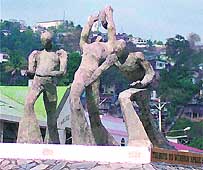
"Spree"
 Monument to "Spree" Simon in John John
Monument to "Spree" Simon in John John
|
WINSTON SIMON
|
| DATE OF BIRTH: |
1930 |
| PLACE OF BIRTH: |
East Dry River, Port-of-Spain, Trinidad |
| EDUCATION: |
... |
| STEELBANDS: |
Tropical Harmony (1940s)
Fascinators (1940s)
Destination Tokyo (1940s - 1950s)
TASPO (1951)
|
| SPECIALTIES: |
Tuner
Player
|
| CAREER: Simon was making music at a very young age and would take to the streets with other boys making music during Carnival, Emancipation Day, and other days of celebration. Simon developed an 8-note ping-pong (tenor pan) in 1943 and, by 1946, had increased its range to 14 notes. When steelbands took to the streets on May 8, 1945, Allied Victory Day, Simon was the leader of the John John Band (Destination Tokyo) when he 15 years old. He is best remembered for his virtuoso performance on Carnival Tuesday (March 5) 1946 when he played four tunes on his pan to an elite audience that included the Governor, Sir Bede Clifford. His selections were "I Am A Warrior," Lord Kitchener's "Tie-Tongue Mopsy," Schubert's "Ave Maria," and the national anthem, "God Save The King." He lived in the John John area and was the first leader of Destination Tokyo in 1948. It is believed that he led Tropical Harmony and Fascinators at the same time. He was one of eleven panmen selected to join TASPO as the Trinidad & Tobago representatives at the 1951 Music Festival in England. After his tour of England with TASPO, Simon went to Africa to teach the art of playing and tuning pans. He was immortalized in 1975 by Lord Kitchener in the calypso "Tribute to Spree Simon," and a monument to his contribution to the steelband was installed in John John. |
AWARD:
- 1974 - Trinidad & Tobago Public Service Medal of Merit Gold (for Contribution to the Development of the Steelband)
|
| DIED: |
April 18, 1976 |
| Compiled by Ronald C. Emrit |
|



